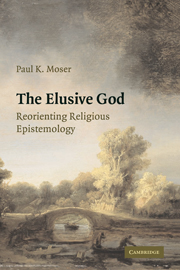Introduction
Published online by Cambridge University Press: 29 July 2009
Summary
QUESTIONS
According to Blaise Pascal's Pensées, any religion denying that God's existence is concealed is false (1670, sec. 275, Sellier ed.). The same holds for any philosophy, science, or other theory that denies divine concealment. Let's say that God's existence is concealed, hidden, or incognito for a person at a time if and only if at that time God's existence fails to be not only obvious but also beyond cognitively reasonable doubt for that person. Many psychologically normal adults hold that God's existence is hidden from them at least at some times. At those times, they report, God's existence isn't obvious or even beyond cognitively reasonable doubt for them.
Here and throughout we'll use the overused term “God” as a maximally honorific title that connotes an authoritatively and morally perfect being who is inherently worthy of worship as wholehearted adoration, love, and trust, even if God doesn't actually exist. This title, in keeping with titles generally, is intelligible even if it lacks a titleholder. We'll use “authoritative” to signify worthiness of an executive decision-making status in some area, and “perfectly authoritative” to connote such inherent worthiness regarding every relevant area. So, one doesn't become authoritative just by amassing clout.
It seems undeniable that God's existence is hidden at least from some people at some times. The theme of divine concealment is endorsed, in one form or another, by many influential proponents of Jewish and Christian monotheism, including Isaiah, Jeremiah, Ezekiel, Jesus, Paul, Augustine, Maimonides, Aquinas, Luther, Pascal, Kierkegaard, Buber, Barth, Brunner, Bonhoeffer, Rahner, and Heschel.
- Type
- Chapter
- Information
- The Elusive GodReorienting Religious Epistemology, pp. 1 - 28Publisher: Cambridge University PressPrint publication year: 2008



